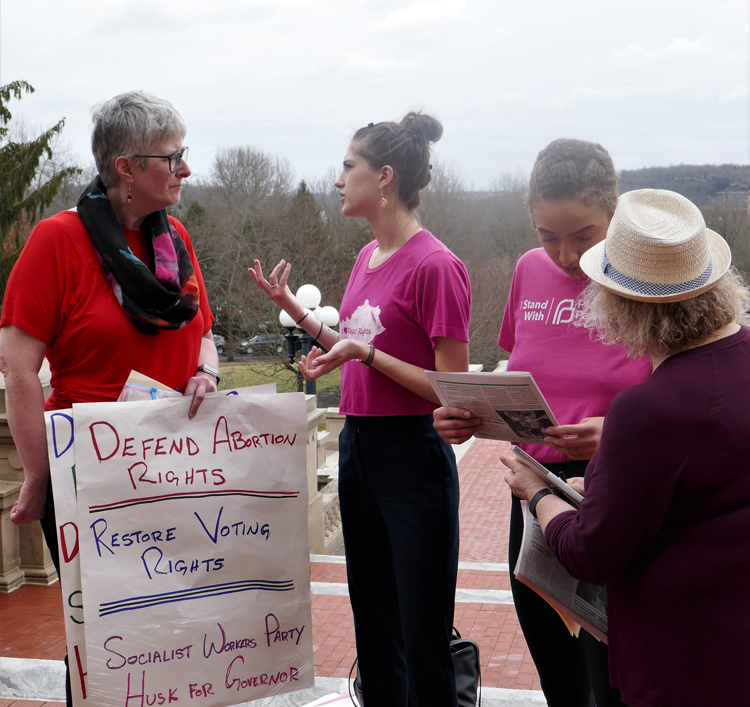FRANKFORT, Ky. — More than 100 protesters gathered at the state Capitol here Feb. 7 to demonstrate in defense of a woman’s right to choose abortion.
They were speaking out in opposition to a bill in the state legislature that would ban abortions from the moment a fetal heartbeat is detected, usually around six weeks into a pregnancy, as well as against other moves by the state government to further limit women’s access to abortion.
The action was called by Planned Parenthood Advocates of Indiana and Kentucky, together with the American Civil Liberties Union of Kentucky.
“Abortion is not something a woman takes lightly. But this is my right as a woman. I get to decide!” Louisville poet and writer Hannah Drake told the crowd. “My womb, my choice, my reasons — I will not go back. This is about reproductive freedom and we will not go back.”
Kate Miller, advocacy director for the Kentucky ACLU, told participants that there are several bills in the legislature that would restrict abortion rights. “These people who claim they want to protect human lives express no concern for the fact that the U.S. has the highest rate of maternal deaths in the developed world,” she said, “and that Black women die at double that rate.”
“I’m tired of being talked about like my only purpose on earth is as a vessel to reproduce,” Nichole Stipp from Planned Parenthood said. “If you’ve had enough, get out and change it. Go home and tell your story.”
Many of those at the protests shared experiences and exchanged ideas on how to fight to win the fundamental right of women to control their own bodies. Among them were Amy Husk, Socialist Workers Party candidate for governor of Kentucky, and a number of her campaign supporters.
How can we win?
Husk introduced herself to Annie Prestrud, an activist with the Religious Coalition for Reproductive Choice and the Kentucky Health Justice Network, who said she became radicalized as a teenager around the question of women’s right to choose abortion. “Abortion is really a question of health care just like any other medical procedure,” she said. Husk agreed, saying it’s a fight in the interests of the entire working class.
“Workers are facing worse and worse conditions today and we need to organize to fight against what the bosses and their government are doing to us, but we can’t do it if we’re divided,” Husk said. “The fight for women’s right to abortion is part of the fight to unify the working class.”
“Yes, capitalism isn’t working,” Prestrud said. She got a copy of In Defense of the US Working Class by SWP leader Mary-Alice Waters and said she wanted to hear more about the SWP campaign.
This reporter met Tracy Gregoire, a nurse who works in labor and delivery, and we discussed how to fight for abortion rights. “In too many places we have to appeal to ‘experts’ to say if you are ‘qualified’ to have an abortion,” she said.
“Some of the challenge we face lies in weaknesses in the Supreme Court’s Roe v. Wade decision itself,” I said. “It doesn’t rest on fundamental constitutional rights of the woman, but on a doctor’s agreement and with restrictions based on the science at the time, which opened the door to anti-women’s-rights forces pushing back.
“Our right to abortion comes from the 14th Amendment to the Constitution, won out of the mighty second American Revolution in the war to abolish slavery,” I said. “That amendment made government interference with the rights of anyone in this country illegal, and guaranteed equal protection of the law to all. That should make it illegal for any government to interfere with the personal decisions of a woman.”
Upon meeting Husk, Gregoire said that she was concerned about those who support the legislators’ attacks on abortion rights because they personally don’t like the idea of abortion.
“When we knock on the door of workers who say they are personally opposed to abortion, we explain that the point isn’t what you or I think about it, or whether we would ever have one. It’s that doctors and the government shouldn’t have the right to tell women what to do with their bodies,” Husk said. “When they think about the fact that the government shouldn’t interfere with anyone’s personal choices, many are won over to support this right.”


